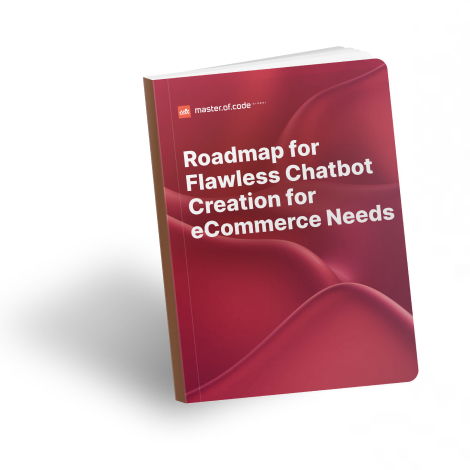Studies predict that 95% of all purchases will be made online by 2040. And it seems that the solution to stay trendy and keep businesses updated is AI shopping assistants. The primary advantage of such tools is personalization.
According to Grand View Research, the global B2B eCommerce market is expected to grow at a compound annual growth rate (CAGR) of 18.7% from 2021 to 2028.
Chatbots for eCommerce are the latest and greatest developments for enhancing online shopping experience. They’re friendly, helpful, and available 24/7 to answer your questions. This virtual shopping assistant helps you find the perfect product and guides you through the checkout process. In this article, we’ll explore the benefits of AI personal shopping assistants for both businesses and customers. So, let’s dive deeper into the topic.
Table of Contents
What are AI Shopping Assistants and What They Can Do?
An AI shopping assistant is a tool that gives customers a hand in finding desired products. They function by responding to inquiries and helping users navigate online shops. Certain AI personal shopping assistants are even capable of placing orders on your behalf.
To get this helpful tool for your business, you can choose from various forms and types of this software, such as:
- Chatbots
- Voice assistants
- Mobile apps
- Conversational AI
- Browser plugins
They can perform a variety of tasks, such as providing product recommendations or basic information about goods. An AI shopping assistant can help shoppers find the right variant, even if they don’t know exactly what is needed. This type of software can search by keyword, category, brand, price, and other criteria.
An AI-powered shopping assistant helps compare prices from different retailers, so website visitors can find the best deal. Summing up, customers will complete the checkout process quickly and easily with these tools.
No matter the purpose or ways you use an AI shopping assistant, its main aim is to enhance the shopping experience.
Use Cases of AI Shopping Assistants
Here are just a few of the ways that a virtual shopping assistant can make your clients’ online shopping experience more enjoyable.
Customized Recommendations
A majority of consumers (86%) say that personalization is important in their purchasing decisions. For online shoppers, personalization is even more important. Nearly a half (45%) of users are more likely to shop on a site that offers personalized recommendations. More than a half (56%) are more likely to return to a site that offers product recommendations.
AI personal shopping assistants transform the experience user’s get, turning it into an individualized journey. They use customer data to provide product suggestions, offer customized content and promotions. These can be communicated via pop-ups, emails, or directly on the product page.
An AI shopping assistant can learn the website visitors’ preferences and shopping habits over time. It uses this information to provide them with more personalized assistance. For example, an average AI personal shopping assistant can recommend products that buyers are likely to be interested in. It can also help find the best deals on the searched items.
The H&M virtual shopping assistant gets instant updates, tracks orders, and uses photos to find similar items in stock. Let’s take a look at its features:
- Find in store: shows all available sizes and colors the brand has in stock.
- Scan & find: shows if the item is available in other sizes and colors.
- Visual search: allows customers to explore what the brand has to offer by using the provided photos or screenshots.
- Heart Icon: save the preferred items.
- In-store mode: see which of your favorite marked goods are available in the store you’re in or nearby.
- Push notifications: get information about designer collection drops or notification about brand special offers and events.
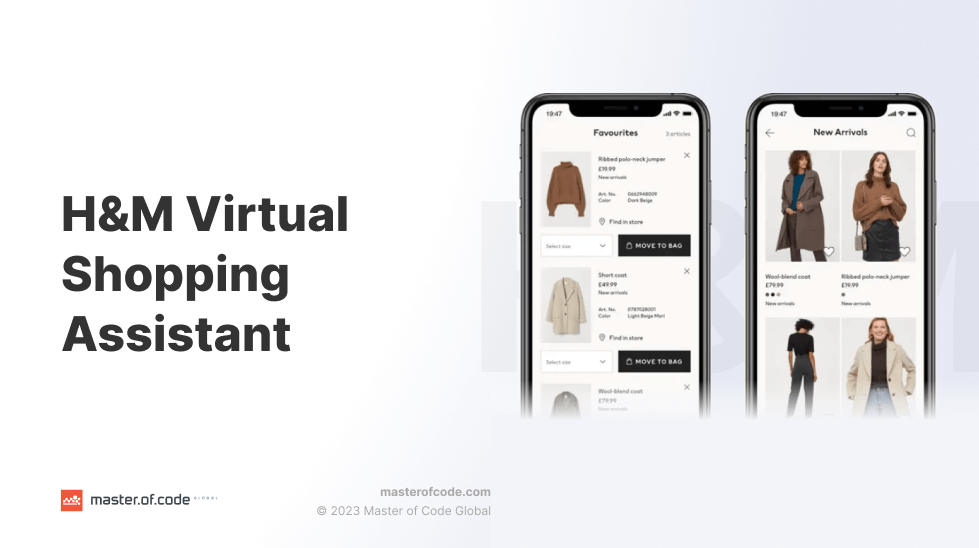
Conversational Commerce
AI shoppers aren’t just reactive—they can proactively guide shoppers through natural, chat-based interactions. This approach, known as conversational commerce, allows users to ask questions, compare products, or get styling advice—all within a familiar messaging interface.
Whether embedded in a website, mobile app, or messaging platform like WhatsApp or Messenger, these assistants replicate the experience of an in-store associate. They can answer sizing questions, provide curated bundles, or even help with checkout—reducing drop-offs and creating a more intuitive path to purchase.
For brands, this means higher engagement and improved conversion rates. For shoppers, it’s about simplicity and speed.
AI Virtual Shopping Assistants
Businesses frequently use chatbots on their online platforms to improve customer experiences. These automated systems handle common queries, provide quick responses, and offer basic assistance. Such approaches enhance overall customer engagement and satisfaction. Let’s take a closer look at how to use AI as a shopping assistant.
Master of Code Global, in collaboration with Infobip, developed the first Generative AI chatbot. The primary goal of the BloomsyBox AI Virtual Shopping Assistant was to create personalized greeting cards.
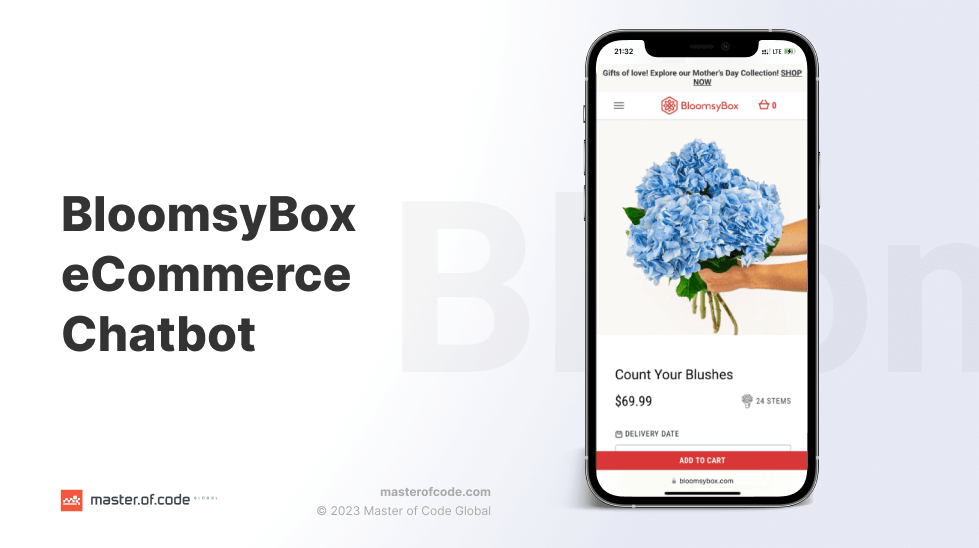
To generate user-centered messages, our team of experts applied the LLM Orchestration Framework Toolkit. As a result, 60% of users who engaged with the bot completed the quiz and 78% of the winners claimed their prize.
One more remarkable example is the Master of Code Global project for eBags — the largest bag retailer in the world. The project comprised two phases: the development of eCommerce apps and eBags Connected Tags.
The Master of Code Global team achieved remarkable results. After nearly 8 months of effort, the eBags application was downloaded over 40,000 times.
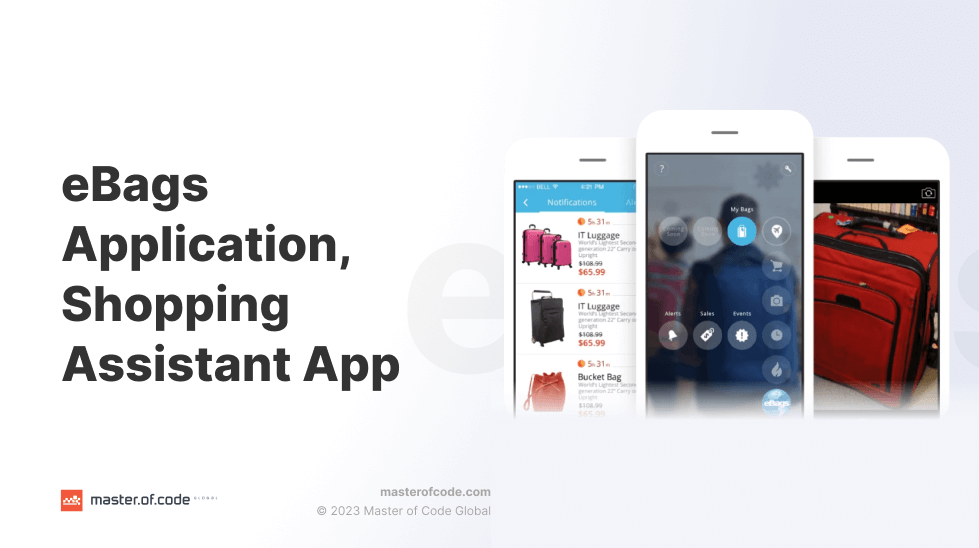
The eBags app is a one-stop shop for all bag and travel accessory needs. With its cool visual product search algorithm, buyers can easily find the perfect bag by snapping a picture of one they like or have seen elsewhere.
The app also gives access to the full eBags inventory, so users can browse and shop at their convenience. Plus, we included the option of push notifications about exclusive discounts and sales events.
Voice Assistants
You can use the voice assistant to search for products online and in-store. For example, you could say “Alexa, search for a black dress on Amazon” or “Hey Google, find a grocery store near me that sells organic milk.”
After finding products you like, use your voice assistant to compare prices from various retailers.
Then just add items to your cart. For example, you could say “Alexa, add the dress to my Amazon cart”. When you’re ready to check out, use your voice assistant to complete the purchase. That’s it!
As well voice assistants can handle more advanced shopping tasks, such as:
- make personalized recommendations,
- create and manage shopping lists,
- track orders.
However, as voice assistants are still developing, they can make shopping more convenient. With technology advancing, AI-based shopping assistants will become even smarter and more effective.
Customer Service Assistance
AI shopping assistants play an important role in providing customer support. Their value lies in an ability to handle order status inquiries and assist with returns and exchanges. By responding to queries, AI personal shoppers efficiently solve customer problems. Such tools tailor responses to individual buyer needs and elevate the customer experience to a whole new level.
Virtual shopping assistants help customer service employees do their jobs better. They give workers access to real-time information, client profiles, and task management tools. So, customer service reps can focus on complex issues, such as resolving product defects or helping with tech problems.
AI personal shopping assistants help businesses strengthen relationships with clients and foster customer loyalty. Sephora’s Online Customer Service assists its clients with various issues, including orders, delivery, membership, store-related questions, and more.
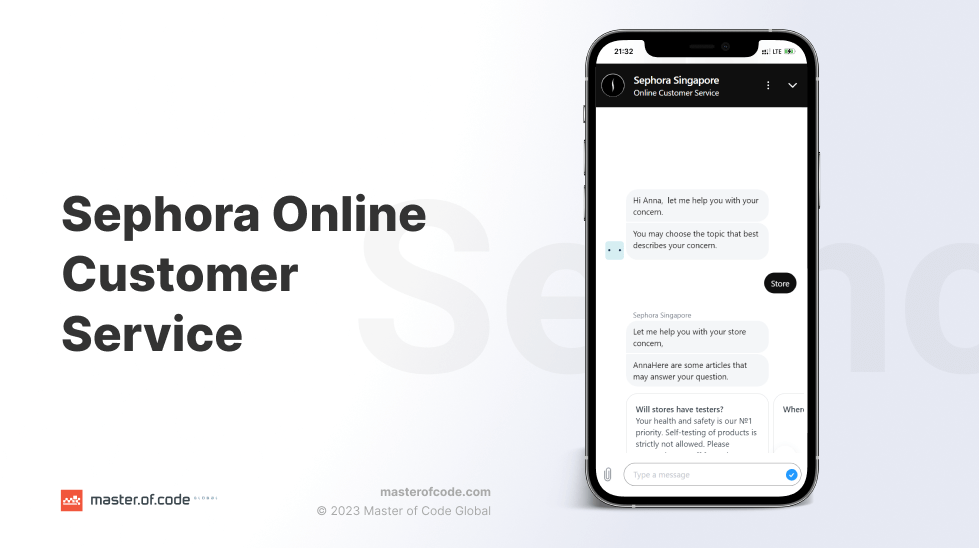
Furthermore, you can experience a virtual makeover with Sephora’s Virtual Artist. This virtual shopping assistant lets you try on products from anywhere using facial recognition. It helps clients in finding products, offers tutorials, and provides personalized recommendations.
Agentic AI in Personal Shopping
Agentic AI marks a new era in AI personal shopper capabilities—one where the assistant doesn’t just respond but takes action on the user’s behalf. These autonomous systems can proactively manage tasks, learn from interactions, and improve continuously without constant oversight.
For example, an AI shopper can recommend complete outfits instead of individual items, drawing on contextual signals like weather, events, or seasonal trends. It can manage and update a shopper’s wish list automatically—removing out-of-stock items, flagging discounts, and suggesting substitutes when styles change. Over time, it self-optimizes by analyzing user behavior: favorite brands, price sensitivities, browsing habits, and even return patterns.
This level of autonomy creates a more seamless and intuitive shopping experience. Users spend less time searching and comparing, and more time receiving highly curated, relevant suggestions. For retailers, it’s an opportunity to increase engagement, drive loyalty, and boost repeat purchases without overwhelming the customer with decisions.
As agentic AI matures, expect personalized shopping assistant tools that act more like personal stylists or concierge shoppers—empowered to make decisions, adapt strategies, and deliver exceptional, frictionless service with minimal input.
Conversational AI and Shopping Assistants
Conversational AI is the engine behind today’s most intuitive and helpful AI shopping assistant examples. By using natural language processing (NLP) and intent recognition, these systems allow shoppers to interact in real-time—just like they would with a helpful store associate.
Instead of clicking through endless filters and menus, users can simply type or speak requests like “Find me a leather backpack under $200” or “Do you have this in size M?” The AI understands context, asks clarifying questions if needed, and guides users to the right product quickly. These natural language shopping assistants reduce friction, increase satisfaction, and keep users engaged throughout their buying journey.
Beyond discovery, conversational AI also powers 24/7 Q&A bots that handle queries about shipping, returns, availability, and more. Customers get instant support without waiting for human agents.
Even checkout can be streamlined—shoppers can add items to their cart, apply promo codes, and complete purchases directly within the chat interface. This frictionless experience minimizes drop-offs and increases conversion rates.
With conversational AI at the core, shopping assistants don’t just answer—they guide, assist, and convert in real time, delivering a smarter and more humanized digital shopping experience.
Generative AI for Personalized Shopping
Generative AI is redefining how brands personalize the shopping experience—moving beyond static recommendations to dynamic, tailored interactions. Instead of relying solely on past behavior, GenAI can synthesize vast datasets in real time to generate highly relevant content for each individual shopper.
One of its most compelling applications is in gift suggestions. By analyzing buyer intent, recipient preferences, and even seasonal trends, GenAI can recommend the perfect gift—be it a luxury item, a personalized gadget, or a thoughtful bundle. It can even generate greeting card messages to accompany the purchase, turning a simple transaction into a memorable experience.
Retailers also use GenAI to create on-brand product descriptions at scale. These AI-written blurbs highlight features, evoke emotion, and adapt tone for different target audiences or channels.
Shoppers benefit from curated picks tailored to their style, size, and budget—generated on the fly. Whether it’s recommending full outfits, themed gift guides, or seasonal essentials, GenAI ensures every interaction feels uniquely personal.
This level of customization helps reduce choice overload, boosts engagement, and increases the likelihood of conversion—transforming the digital storefront into a truly intelligent, customer-first experience.
Benefits for Business
AI shopping assistants offer benefits for both retailers and shoppers, enhancing satisfaction. This way, they are increasing sales while reducing support costs. In this section, we will explore how technology makes purchasing more engaging and personalized.
Reduced Costs and Time
By automating tasks like answering FAQs or providing product information, AI shopping assistants reduce the workload of customer support staff. As a result, businesses can allocate resources more efficiently.
Personalize Engagements
AI shopping assistants enhance customer engagement by providing tailored product recommendations. They also offer prompt responses to customer inquiries, thus elevating the buying experience.
Cross-Selling and Upselling
Virtual shopping assistants suggest items to buy based on past purchases and browsing history. Thus, using individualized product recommendations can create more opportunities for increased sales.
Inventory Management
Businesses can incorporate AI personal shopping assistants with inventory systems to offer real-time checks. When a user asks about a specific product’s availability, the assistant can provide the information right away. So it will cut wait times and enhance customer satisfaction.
Here Are Some Ways to Integrate AI Technologies into Your Shopping Service
Chatbot using natural language processing allows buyers to communicate with AI as they would with a real person. The software understands the simple human language, recognizes user requests and runs the required actions.
Image recognition is the alternative to text search. Visual search processes uploaded photos and provides similar items. If the client likes someone’s shoes and wants to buy them, the program makes it easy to discover where this or similar item is in stock. Just upload a relevant picture of an item.
Personalized recommendations are powered by machine learning as well. If your shoppers purchase the shoes they were looking for by using a visual search, the program can recommend other matching parts of the outfit. If clients typically buy shoes from a specific brand, the app will display targeted offers that might interest your buyers.
Price prediction algorithms learn of price drops or hikes to help your users snag the best deal. The system will notify them if the price of the favorite item is soon to be reduced. This way, your customers can wait a little to save some money on this particular good and spend them on an additional one. This is the perfect strategy for non-aggressive upselling.
MONA is a popular shopping assistant app. With it in place, your buyers can conveniently browse the collection and use various services on the go. They can safely explore and purchase new fashion picks. Likewise, your clients will also enjoy exclusive discounts and bonuses.
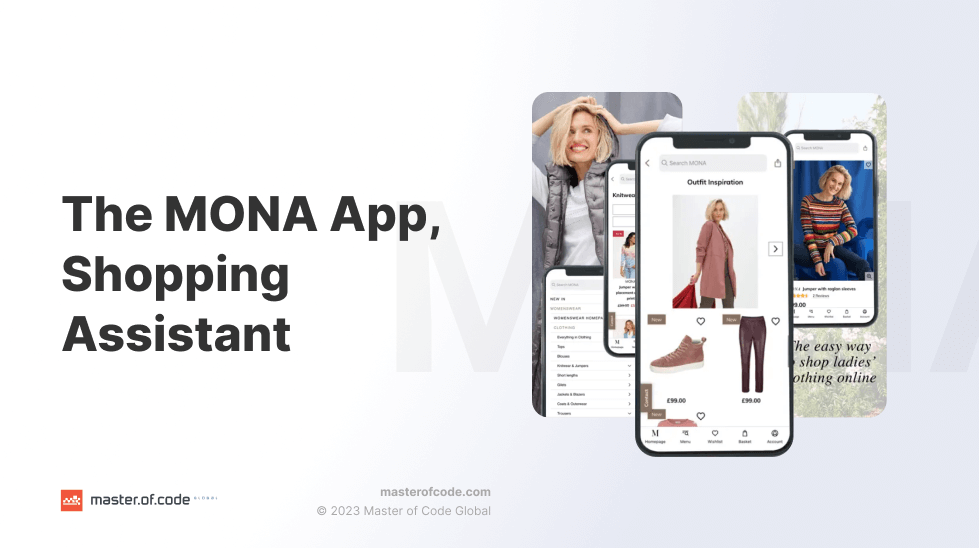
Just explore the features and benefits users will discover with the MONA app:
- MONA is constantly accessible wherever they are, 24/7.
- Current details on special deals and markdowns.
- Modern fashions and timeless styles.
- A user-friendly search tool—input the product’s name, code, or category.
- Dress ideas to inspire the creation of a fresh ensemble.
- Convenient access to the wish list, orders, and account.
- Sizing assistance to help in finding the ideal fit.
Personal Shopper App Powered by Both Data Intelligence and Humans
The companies partly use AI and machine learning to automate certain tasks, but generally rely on agents. The mixed approach provides fast and effective services while keeping the human touch:
Fully customized services are provided. Users are usually looking for a sense of style and want to be pleasantly surprised when using a personal shopper app. The algorithms can hardly meet highly personalized requests, but an online consultant can.
Continuous learning from interactions with the client. The machines can learn. However, this understanding of customer personality is something only a real person can grasp. Agents use such information to tailor services and send clients only carefully selected recommendations.
How to Develop a Personal Shopper App Based on Artificial Intelligence
Remember a time when there was no option to shop online, and people had to spend hours at the mall? That experience could be very emotional and stressful. So it led to creating a nerves-retaining profession – a progenitor of a personal shopper app – a shopping assistant.
However, we can now buy almost everything with the click of a mouse or even with a tap on a smartphone – the mobile commerce industry is growing rapidly.
It is still difficult to find exactly what users want among millions of items, even on progressive platforms such as Amazon or eBay. A search for the best deal takes a lot of time, and this is where a personal shopper app comes in handy.
Reasons to Build a Personal Shopper App
As we have already mentioned above, a shopping assistant app is beneficial for both customers and businesses. Let’s find out what is so special about this software and why it’s worth deployment.
Typically, the services virtual assistants offer users include:
- personal shopping services;
- bookings and reservations;
- ticket purchase and delivery;
- bonuses, awards, and last-minute gift options.
A lot of these apps cost nothing to download, but that is not the only benefit for users.
Pros for the Customers:
- personalized services;
- automatization saves time and money;
- keeps all purchases organized;
- tracks the orders from the app;
- monitors price movements to make it possible to buy items for less money.
As for businesses, building a personal shopper app for iPhone or Android may be a great investment.
There Are Numerous Ways to Monetize Such Applications:
- paid requests;
- purchase commissions;
- membership fees for brands and vendors;
- advertising.
Shopping Assistant App Algorithm
The app can be powered by Data Intelligence or combine both AI and human elements. AI operates data intelligence apps. These specially developed algorithms make suggestions based on learning user behavior.
There are no human consultations involved, which optimizes the shopping experience quite a bit.
Such Apps Typically Include Tools to Make It Easier to Get the Best Deal:
- Best price comparison;
- coupons and discounts;
- safety alerts;
- shopping history;
- package tracking.
Human-based apps are commonly called an ‘online shopping assistant’. The real person is behind the interface. They are the ones who do all the work, including making consultations and ensuring the offered solution is the best.
Let’s take a closer look at the pros and cons of both groups of apps.
AI-based Shopper Assistants
As it was previously mentioned, AI-based applications rely on a set of machine learning algorithms. The apps can browse through hundreds of online catalogs and websites. They find a required item many times faster than specially trained humans can.
Also, advanced AI-based personalization should be noted. The algorithm searches the users’ data to learn shopping trends, individual habits, and preferences. The collected information allows for making personalized suggestions and also improves the accuracy of search results.
Building a Personal Shopping Assistant Is Relatively Easy
Basically, virtual shopping assistants are similar to traditional eCommerce applications. Both have a user account, cart, payments, order tracking, and purchasing history. Here is an approximate estimate of feature development:
Front-end:
- a simple chat – 40 hours;
- a user account – 32 hours;
- a shopping cart and payments – 32 hours;
- order tracking – 16 hours;
- a shopping history – 16 hours.
Back-end:
- 80-160 hours to implement all the backend features listed.
Wrapping up…
A whole new application might seem like too much work and expenses for the businesses. That is totally OK, as today there are some more affordable options available. If you want to augment your existing app or website, a chatbot might be exactly what you are looking for.
Master of Code Global’s solutions have been already employed by more than 1 billion users globally. Our diverse portfolio includes global brands, enterprises, and successful startups. Our skilled team seamlessly integrates AI, enhancing business performance and customer satisfaction.
This way, we ensure every client gets tailored experience, as Master of Code Global is where business vision meets technology mastery. Contact us to get a profound consultation or a strategic session with our experts. We will definitely help you find the best fitting solution.
Ready to build your own Conversational AI solution? Let’s chat!





